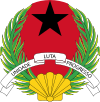Guinea-Bissau–Russia relations
 | |
Guinea-Bissau |
Russia |
|---|---|
Guinea-Bissau–Russia relations are the bilateral foreign relations between Guinea-Bissau and Russia.
Soviet-era relations
Relations between the Soviet Union and the
The
After a visit by Amílcar Cabral to Moscow in 1961, the Soviets formally established ties with the armed revolutionary group African Party for the Independence of Guinea and Cape Verde (PAIGC). The Soviets gave weaponry to PAIGC guerrillas, including bazookas, rocket-propelled grenades, AK-47 rifles, and eventually (shortly after the assassination of Amílcar Cabral) Strela-2 missiles.[7] The Soviets also provided guerrilla-warfare training for PAIGC fighters at Perevalne, Ukraine, as well as training for nurses.[7] On February 21, 1975, the Soviets and Bussau-Guineans signed a bilateral accord providing for close ties; as part of the agreement, Aeroflot flew Bissau-Guinean students to the Soviet Union for training and education.[7] Between 1973 and 1992, about 3,000 young Bissau-Guineans studied on scholarships in the Soviet Union; an additional 3,000 scholarships came from Cuba, and 61 from East Germany.[7] Many other such cultural, economic, and technical treaties were signed between the two nations.[8] Soviet-Guinea-Bissau ties weakened after the USSR began to collapse in 1991.[7] The "huge stockpile of Soviet-made weapons and ammunition" in the county fell into the hands of rebels led by Ansumane Mané during the Guinea-Bissau Civil War (1998-1999).[7]
Russian Federation relations
Diplomatic ties
On 31 December 1991, Guinea Bissau recognised the
Political ties
In August 2001, Russia forgave eighty percent of Guinea-Bissau's debt, which was reported to be valued at
On 1 March 2009,
Cultural ties
Mr Helbert was held hostage in the embassy in Moscow in January 2005 by students from Guinea-Bissau who were protesting at their stipends not being paid.[15]
See also
References
- ^ Гвинея-Бисау - Россия (in Russian). Africana.ru. Retrieved 2009-07-17.
- ISBN 90-286-0609-2. Retrieved 2009-07-17.
- ISBN 0-202-24156-4. Retrieved 2009-07-17.
- ^ Thom, William G. (July–August 1974). "Trends in Soviet Support for African Liberation". Air University Review. Retrieved 2009-07-17.
- ISBN 90-247-3628-5. Retrieved 2009-07-17.
- ^ Babbitt, James (1989). SOVIET ARMS TRANSFERS TO SUB-SAHARAN AFRICA. WHAT ARE THEY WORTH IN THE UNITED NATIONS?. pp. 58–59.
- ^ a b c d e f Peter Karibe Mendy & Richard A. Lobban Jr., "Union of Soviet Socialist Republics (USSR)/Russia, Relations With" in Historical Dictionary of the Republic of Guinea-Bissau (4th ed.: Scarecrow Press, 2013), pp. 407-10.
- Martinus Nijhoff Publishers, 1987), p. 450.
- Russian Ministry of Foreign Affairs. 16 February 2009. Retrieved 2009-07-17.
- ITAR-TASS. 20 October 1998. Retrieved 2009-07-18.
- Ukaz #1663 of 1 December 2008 On the appointment of M.Ya Valinsky as Ambassador of the Russian Federation to the Republic of Guinea-Bissau. ).
- ^ "Список руководителей дипломатических и консульских представительств зарубежных государств в России". Ministry of Foreign Affairs (Russia). 11 November 2008. Retrieved 2009-03-04.
- Radiodifusão Portuguesa. 7 August 2001. Retrieved 2009-07-22.
- ^ "Russia condemns assassination of Guinea-Bissau president". Moscow: RIA Novosti. 2 March 2009. Retrieved 2009-07-22.
- ^ "African envoy seized in Moscow". BBC News. 26 January 2005. Retrieved 2009-07-18.


